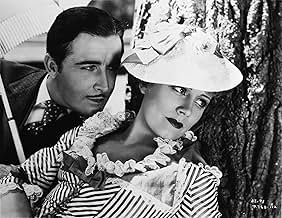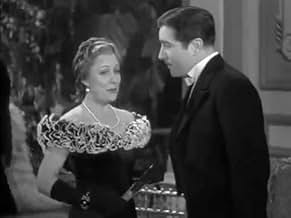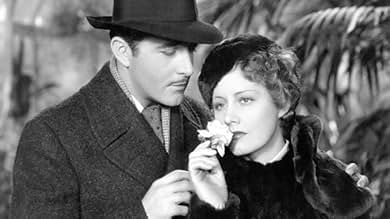An engaged attorney and a divorcee fall for each other in 1870s Manhattan.An engaged attorney and a divorcee fall for each other in 1870s Manhattan.An engaged attorney and a divorcee fall for each other in 1870s Manhattan.
Barry O'Moore
- Mr. Welland
- (as Herbert Yost)
Lowden Adams
- Jenkins
- (uncredited)
Muriel Barr
- Miss Allison - Jenkins' Daughter
- (uncredited)
Harry Beresford
- Museum Guard
- (uncredited)
Lynn Browning
- Miss Archer
- (uncredited)
Herbert Bunston
- W.J. Letterblair
- (uncredited)
Bess Flowers
- Child's Mother
- (uncredited)
Alf James
- Man Who Comes with Chairs
- (uncredited)
John Merton
- John
- (uncredited)
Storyline
Did you know
- TriviaThe original Broadway production starred Katharine Cornell as Ellen Olenska, and Franchot Tone as Newland Archer.
- GoofsAs evidenced by a dated letter, Newland assisted Ellen with her divorce case in August 1879. Newland and May were married just after the following Easter, which would make it 1879. After returning from their honeymoon, they receive an invitation for a party on Wednesday, October 2nd. That would be correct if it was still 1878, but in 1879, October 2nd was a Thursday.
- Quotes
Julius Beaufort: After all your exquisite associations over there, how do you think you're going to like it here?
Ellen: I think it quite like heaven.
Julius Beaufort: Yes, I have that feeling too sometimes. You mean, just some place to go after you're dead?
- ConnectionsReferences All Quiet on the Western Front (1930)
- SoundtracksNone But the Lonely Heart
(1869) (uncredited)
Music by Pyotr Ilyich Tchaikovsky
Played during the opening credits and often as background music
Featured review
Technically speaking, this is a generally well made film. The acting (apart from some serious over-melodramatic acting from John Boles) was good and the entire production looked marvelous. So why, then, only a score of 5? Well, the story seems to try hard to make an excellent point--only to have it undone by plot holes that just don't make a lot of sense. Perhaps in the original Edith Wharton novel this is not the case, but here the film seems to be missing something.
The film begins with Boles ("Newland Archer") becoming engaged with his long time sweetheart, May. They seem like a happy couple and they are going into the upcoming marriage with not a care in the world other than wanting to marry sooner than later. At about the same time, May's cousin (Countess Ellen Olenska--played by Irene Dunne) is arriving from Europe and there is a great scandal because Mrs. Olenska is planning on divorcing her husband--something that polite society at the time would NEVER condone. It is interesting that we never see her husband nor do we really know much about their marriage other than the fact that she is unhappy and wants out--even though her family is strongly in favor of her remaining married. The family's wishes, oddly, are NOT because of a love for Olenska but because they were more concerned about how the scandal would ruin their good name! Many, in fact, were totally unconcerned about her soon to be ex-husband nor about adultery--just what others would think. This hypocrisy made for an excellent theme and I wish the film had really worked more on this angle.
Unfortunately, out of the blue, Archer suddenly announces to the Countess that he loves her!! Where this comes from makes no sense at all--especially since his bride to be is a sweet lady who has done no one wrong. Yet despite this profession, Archer still marries May and they go on their honeymoon. During this time, Archer is distant and quite frankly a major jerk--pining for the Countess and ignoring his poor wife. Frankly, any sympathy you had for the Countess and her divorce is quickly lost because she, too, is conspiring with Archer to run away together. So instead of an excellent story of hypocrisy, the story becomes a story of lust and selfishness--making the viewer really hate Boles and Dunne (especially Boles). All the great buildup of the last hour of the film is practically thrown away when this affair appears out of nowhere.
So what, at this point, is the point of the film? This ambiguity was a serious deficiency with the film. Had Archer never married May and then run off with the Countess, then you might have had a lot of sympathy for the couple. As is, they just seemed nasty and selfish. And the overall message seemed muddled. Were they trying to excuse away adultery or somehow trying to be pro-marriage? I really don't know. Had Archer acted rationally and consistently and less like a weasel, then this message would have been much more clear. As a result, it seriously deadens the impact of this film. It COULD have been much, much better.
The film begins with Boles ("Newland Archer") becoming engaged with his long time sweetheart, May. They seem like a happy couple and they are going into the upcoming marriage with not a care in the world other than wanting to marry sooner than later. At about the same time, May's cousin (Countess Ellen Olenska--played by Irene Dunne) is arriving from Europe and there is a great scandal because Mrs. Olenska is planning on divorcing her husband--something that polite society at the time would NEVER condone. It is interesting that we never see her husband nor do we really know much about their marriage other than the fact that she is unhappy and wants out--even though her family is strongly in favor of her remaining married. The family's wishes, oddly, are NOT because of a love for Olenska but because they were more concerned about how the scandal would ruin their good name! Many, in fact, were totally unconcerned about her soon to be ex-husband nor about adultery--just what others would think. This hypocrisy made for an excellent theme and I wish the film had really worked more on this angle.
Unfortunately, out of the blue, Archer suddenly announces to the Countess that he loves her!! Where this comes from makes no sense at all--especially since his bride to be is a sweet lady who has done no one wrong. Yet despite this profession, Archer still marries May and they go on their honeymoon. During this time, Archer is distant and quite frankly a major jerk--pining for the Countess and ignoring his poor wife. Frankly, any sympathy you had for the Countess and her divorce is quickly lost because she, too, is conspiring with Archer to run away together. So instead of an excellent story of hypocrisy, the story becomes a story of lust and selfishness--making the viewer really hate Boles and Dunne (especially Boles). All the great buildup of the last hour of the film is practically thrown away when this affair appears out of nowhere.
So what, at this point, is the point of the film? This ambiguity was a serious deficiency with the film. Had Archer never married May and then run off with the Countess, then you might have had a lot of sympathy for the couple. As is, they just seemed nasty and selfish. And the overall message seemed muddled. Were they trying to excuse away adultery or somehow trying to be pro-marriage? I really don't know. Had Archer acted rationally and consistently and less like a weasel, then this message would have been much more clear. As a result, it seriously deadens the impact of this film. It COULD have been much, much better.
- planktonrules
- Dec 28, 2007
- Permalink
- How long is The Age of Innocence?Powered by Alexa
Details
- Release date
- Country of origin
- Languages
- Also known as
- La edad de la inocencia
- Filming locations
- Production company
- See more company credits at IMDbPro
- Runtime1 hour 21 minutes
- Color
- Aspect ratio
- 1.37 : 1
Contribute to this page
Suggest an edit or add missing content


































